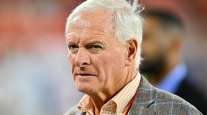Senior Reporter
Ex-Pilot Flying J President Hazelwood, Two Others, to Be Retried

[Stay on top of transportation news: Get TTNews in your inbox.]
There is no question now that former Pilot Flying J President Mark Hazelwood and two former company executives, already convicted of cheating truckers out of diesel fuel rebates, will be retried on federal criminal charges.
What remains unknown, though, is when?
At a telephonic federal court hearing Feb. 18, prosecutors and defense attorneys for the three former executives offered differing dates to begin the defendants’ joint trial sometime in the fall. A significant unknown factor is whether it would be safe for a jury, prosecutors, defense attorneys, witnesses and the public to be crammed into a relatively small courtroom in Chattanooga, Tenn., if the COVID-19 pandemic has not subsided.

wwitv.com
Scott Wombold, a former vice president, and Heather Jones, a former account representative, also will be defendants. They were convicted by a Chattanooga jury on Feb. 15, 2018, in connection with a multimillion-dollar fraud scheme to siphon fuel rebates away from thousands of truckers.
They will now have to be retried after an appeals court reversed their convictions due to the fact that Senior U.S. District Court Judge Curtis Collier of Chattanooga allowed inappropriate secret tape-recorded conversations among the executives to be heard by the jury.
At the Feb. 18 pretrial hearing, prosecutors for the U.S. Attorney’s Office for the Eastern District of Tennessee said they wanted to start the retrial Nov. 1, but defense attorneys suggested starting Sept. 13. Collier asked prosecutors and defense attorneys to decide on a date, and put it in writing by March 15.

What if you could prevent accidents and driver turnover before they happen? In this episode, host Seth Clevenger speaks with two technology CEOs to discuss how machine learning can enable better business decisions and a more proactive stance on safety. Hear a snippet, above, and get the full program by going to RoadSigns.TTNews.com.
He also asked the attorneys to decide if it might be appropriate to provide a questionnaire to potential jurors asking if they be would willing to serve, and for how long, despite threats of a lingering pandemic.
“I’m thinking about the virus now,” Collier told the attorneys. “The expectation, at least according to the president, is that everybody should be vaccinated by the end of July.”
The retrial was ordered by a three-judge panel for the 6th U.S. Circuit Court of Appeals in October that reversed the convictions of Hazelwood, Wombold, and Jones. The three were convicted by a Chattanooga jury on Feb. 15, 2018, in connection with the multimillion-dollar fraud scheme.
In its Oct. 14 decision, the appellate court said the federal district court wrongly admitted recordings of Hazelwood using “deeply offensive racist and misogynistic language” on the theory that if he was “reckless enough to use language that could risk public outrage against the company, he was a ‘bad businessman,’ and as a bad businessman, he was also reckless enough to commit fraud.”
The majority opinion was authored by Circuit Judge Richard Suhrheinrich and supported by Circuit Judge Eric Murphy. Circuit Judge Bernice Donald dissented.
“At issue here is the District Court’s admission of three recordings made on Oct. 25, 2012, at the lake house of a Pilot sales employee,” Donald wrote. “The majority concludes they are not — that the recordings only show Hazelwood’s ‘seriously misguided personal beliefs’ and that ‘having a bad set of personal beliefs did not make it more likely that Hazelwood made bad business decisions, like committing wire or mail fraud.’ ”

Pilot Flying J headquarters in Knoxville, Tenn., was raided by federal agents April 15, 2013. (RaymondClarkImages/Flickr)
The case began with a raid on Pilot’s headquarters in Knoxville, Tenn. More than 50 FBI and IRS agents poured into the company’s three-story offices on the afternoon of April 15, 2013.
Hazelwood’s jury trial lasted more than 27 days. The government called nearly 30 witnesses, including cooperating Pilot employees who pleaded guilty for their roles in the conspiracy. The government also presented emails among the alleged co-conspirators and undercover audio recordings.
Prior to Hazelwood’s trial, 14 former Pilot sales executives had been charged, pleaded guilty and agreed to cooperate with the government while awaiting sentencing. Hazelwood originally was sentenced to 12½ years in prison for his leadership role and fined $750,000.
Want more news? Listen to today's daily briefing below or go here for more info:




